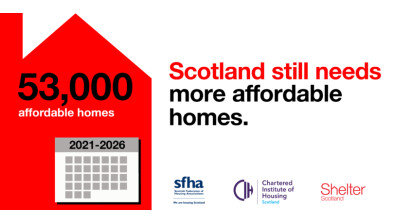Queen’s Speech – Mixed reaction to English Housing Bill
The UK government unveiled more details of its Housing Bill during the Queen’s Speech yesterday but the plans have been greeted with a mixed reaction.
The bill aims to make home ownership an attainable aspiration and contains further measures to deliver an extra 200,000 new homes through the new Starter Homes initiative, which will offer a 20 per cent discount to first-time buyers under 40.
It also sets out details of more controversial measures to offer England’s 1.3 million housing association tenants the chance to buy their homes.
The government has pledged that receipts from selling an owner’s current property will help housing associations to build replacement affordable homes on a one-for-one basis.
To fund this policy the Housing Bill will also require councils to sell their most valuable housing when it falls vacant – with the receipts used to provide new affordable homes in the same area, and the surplus used to fund the Right to Buy for housing association tenants.
Any remaining cash will be invested in a new Brownfield Regeneration Fund to increase the supply of new housing.
A new register of brownfield land will also help fast-track the construction of new homes on previously-used sites near existing communities.
A ‘Right to Build’ in the Housing Bill will also help increase housing supply and diversify the housing sector by giving people the right to be allocated land with planning permission for them to self-build or commission a local builder to build a home.
Self-build delivers a majority of homes in many other countries and can act as a boost to smaller and medium sized builders.

Gavin Smart, deputy chief executive of the Chartered Institute of Housing, has responded to the Queen’s Speech, which also included freeze working age benefits for two years, lower the benefit cap and remove automatic entitlement to housing benefit for 18-21 year olds.
Extending right to buy to housing associations:
“Extending right to buy to housing associations is not going to tackle the housing crisis – in fact it could make things worse for people on lower incomes who are already struggling to access a decent home at a price they can afford. It would have a huge impact both on housing associations and on local authorities, as councils would have to sell off their most valuable homes to fund replacements.
“Our concern is that in practice it would result in the loss of vital social and affordable homes. The government says each home sold would be replaced on a one-for-one basis – but we know this is not happening under the current scheme. Our research has shown that most local authorities only expect to be able to replace half or fewer of the homes they sell under right to buy. And government figures show that between April 2012 and last September councils started or acquired 2,298 homes using right to buy receipts – just one for every 11 sold.
“The government says that replacements for both housing association and council homes sold under the extended scheme would be built in the same area, but this will be heavily dependent on land availability and will therefore be extremely challenging in some inner city and also rural areas.
“The best way of helping people on lower incomes into home ownership is by increasing the supply of affordable housing. CIH is ready to work with the government on the solutions that could make a real difference, for example investing in shared ownership and supporting local authorities on land and asset management to deliver more homes.”
Right to build:
“The right to build, which will require local authorities to identify and release land with planning permission, is a sensible step which could increase the contribution that self-build makes to housing supply. It should also provide a boost for small to medium sized builders which historically have played a critical role in delivering new homes.”
Freezing working age benefits for two years, lowering the benefit cap and removing automatic entitlement to housing benefit for 18-21 year olds:
“Freezing working age benefits for two years fails to reflect the reality of the housing crisis. We are not building enough homes, which means the cost of housing and therefore the housing benefit bill is going up.
“Millions of people have no choice but to rely on housing benefit to secure a roof over their head. That includes an increasing number of people in work – the number of people in work who still have to claim housing benefit has more than doubled from around 445,000 to just over a million in the last five years.
“Cutting housing benefit for under 21s fails to take into account the reality of many young people’s lives. It could have a serious impact on vulnerable young people who have left home, including those who have been rough sleeping and may be forced to return to it. It could also mean that young people would be unwilling to take risks such as moving for work because there would be no safety net for them.
“Our research on the impact of the benefit cap in Haringey showed that people affected by the cap face serious barriers to finding work, including a lack of job seeking skills and affordable childcare. So we think that lowering the benefit cap would be very dangerous unless ministers commit to increasing support for people looking to get back into work and funding for childcare for those people affected.
“Ultimately, if the government really wants to tackle the housing benefit bill, it needs to commit to building more genuinely affordable homes.”

Henry Gregg, assistant director of campaigns & communications at the National Housing Federation, said: “We are pleased to see a Housing Bill front and centre of the Queen’s Speech and to see the Government committed to getting more homes built.
“Plans to identify and free up brownfield land, the Right to Build and Starter Homes are all moves in the right direction and will contribute to resolving the huge housing shortage we have. But we need to ensure these new homes are built where people need them and available at a price people can afford. However, the proposed Right to Buy extension and welfare reforms put these plans at risk.
“The cities devolution bill has the potential to bring an end to the housing crisis in all its different forms, grow local economies and regenerate communities. Housing associations stand ready to engage with local leaders to help create communities where people want to live and work.
“Housing associations are ambitious about building the homes this country needs, particularly affordable housing. We look forward to working with Government to ensure housing associations are given the tools to deliver on their ambition and build the homes this country desperately needs.”
The Association of Retained Council Housing (ARCH) and the National Federation of ALMOs (NFA) believe that it is unfair to fund the extension of the Right to Buy to housing association tenants by forcing councils to sell off council housing that becomes vacant when the present tenant moves on and any decision to sell higher value council housing should be a matter for local determination by each council.
The present system of financing council housing is based on a “self-financing regime” introduced by the coalition government in 2012 based on all party support and to introduce a policy to force councils to sell off council housing goes against the principles of the council housing self-financing regime introduced only three years ago.
John Bibby, ARCH chief executive, said: “The present system of council housing finance was based on a one off payment to or from each individual council based on the value of their housing stock – including both high and lower value housing in their stock. The vast majority of councils whose housing debt was lower than the valuation of their housing stock borrowed to pay the difference to the government at the time and this additional borrowing was funded by the predicted future revenue income stream from the rents on those properties.
“If councils are now to be forced to sell off their higher value stock and handover the receipts to central government to fund Right to Buy discounts to housing association tenants then council tenants will in effect be paying twice. Councils will also lose the higher rental income from any vacant properties sold and this could adversely affect the financial sustainability of councils’ housing business plans and their ability to properly maintain and improve the remaining lower value housing stock.
“Everyone recognises and applauds the desire to help first time buyers onto the housing ladder but this is a very high cost policy which will benefit only a relatively small number of better off housing association tenants who can afford the Right to Buy.
“There are serious questions about whether this policy represents value for money at a time of austerity and there are considerable uncertainties as to whether the compulsory sale of higher value council housing as it becomes vacant will raise sufficient monies to fund the cost of Right to Buy discounts for housing association tenants and compensate housing associations for the loss of their assets, let alone fund the replacement of sold properties on a one for one basis as well as providing a new Brownfield Regeneration Fund for house builders.”
Eamon McGoldrick, managing director at the NFA, added: “ALMOs like councils are also very concerned about the potential loss of high value stock. For example, even if the promised one for one replacement homes can be provided in the areas where housing association and council housing is sold, these new homes will take two to three years to plan and build. In the meantime council waiting lists will get longer and homelessness is likely to increase, leading to additional costs to councils and council taxpayers in securing temporary accommodation through the private rented sector.
“This policy will cost billions of pounds over the life of this parliament and is predicated on selling revenue earning public assets which, at a time of continued austerity, will jeopardise the housing business plans of local authorities and ALMOs.
“There is a risk that this policy will inevitably lead to a depletion of affordable rented accommodation, at least in the short term, and ARCH and the NFA look forward to receiving further details of how this proposal will work in practice.”

Shelter chief executive Campbell Robb said: “After voters and politicians alike made housing a top priority coming into this election, it’s disappointing that a plan with the potential to actually solve the housing shortage has failed to materialise today.
“You simply can’t solve an affordability crisis by selling off what little affordable housing we have left, yet that’s exactly what we’ve seen in this speech. The sums just don’t add up and we know from experience that replacement homes are not being built. With the government’s current track record, extending right to buy will leave even fewer affordable homes for future generations. And, whilst new starter homes might sound good on the surface, they will be funded by removing the requirement on developers to build genuinely affordable homes.
“This speech should have seen the new government take their first steps towards solving our affordability crisis, by setting out a big bold plan to finally build the affordable homes we so desperately need. Instead, we’re left fighting against piecemeal policies that don’t help all those currently struggling with sky high housing costs, and are likely to make things a whole lot worse for future generations.”
On welfare reform, Robb added: “We need a welfare system that’s fair, but taking away the safety net that stands between some young people and the streets is simply not right. Not every young person has the option of going home to their parents – like those escaping violence or thrown out because of their sexuality. For them housing benefit isn’t a lifestyle choice but a lifeline that gives them a safe place to stay for the night.
“A small number of 18-21 year olds need housing benefit in the short-term while they find a new job or get back on their feet. If taking away this part of the safety net forces more young people out onto the streets or back to abusive homes it would be nothing short of catastrophic.”

Reacting to restrictions on housing benefit for 18-21 year olds, Jon Sparkes, chief executive of Crisis, said: “The government’s plan to cut housing benefit for 18-21 year-olds could spell disaster for thousands of young people who cannot live with their parents. At an age when other young people are leaving home to travel, work or study, growing numbers could be facing homelessness and the terrifying prospect of roughing it on the streets.
“For many young people, living with their parents simply isn’t an option. They may be escaping violent or abusive backgrounds; or there may be no room for them in the family home. Housing benefit can be all that stands between them and homelessness. It can mean keeping a roof over their heads whilst they look for work or get their lives back on track. Far from helping them, taking this support away could make it even harder for them to find a job.
“Ministers claim they will protect those with nowhere else to go, but the truth is that it’s very difficult to tell which young people are completely out of options until it’s too late. That’s why we’re urging the Government to make sure all those who can’t live with their parents and are at risk of homelessness are protected.”









